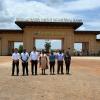As part of the Presidential Initiative on Skilling Uganda, the Government of Uganda is implementing a game-changing intervention: the establishment of Zonal Industrial Skilling Hubs across the country. These hubs are designed to equip youth with practical, employable skills in key trades to foster self-reliance, stimulate entrepreneurship, and reduce unemployment.
Spearheaded by the State House and implemented in partnership with the Ministry of Local Government and various private sector actors, this initiative is redefining how Uganda addresses the challenge of youth unemployment and underemployment.
The initiative aligns with national development priorities under the Parish Development Model (PDM), Emyooga, and other enterprise support programs, offering a pipeline of skilled young Ugandans ready to contribute to the country’s socio-economic transformation.
Scope and Reach.
There are 19 Zonal Industrial Skilling Hubs strategically located across Uganda’s 15 sub-regions. Each hub is designed to train up to 600 youth per year (300 per semester), culminating in an annual national capacity of 12,600 youth. Training is conducted over a six-month period and covers four core trades:
- Carpentry
- Welding
- Tailoring
- Hairdressing
- Building and concrete Practice.
- Bakery and Confectionary.
- Leather designing
These trades were carefully selected based on market demand and potential for self-employment or microenterprise growth. The training is fully supervised by certified instructors under the Ministry of Education and Sports and incorporates practical experience, entrepreneurial mindset development, and financial literacy.
Progress So Far.
19 hubs are operational across the country, and a total of 2,523 youth graduated had graduated as of end of 2023. Some notable performance from the first cohort includes:
- Ankole Region (Mbarara): 235 graduates
- Mubende Hub: 226 graduates
- Bugisu Hub: 215 graduates
- Karamoja Hub: 178 graduates
- Acholi Region (Gulu): 212 graduates
- West Nile Hub: 212 graduates
- Tooro Hub: 201 graduates
Each of these hubs is located in areas with historically high unemployment rates and limited access to technical training, making the impact deeply transformational.
Unique Features of the Skilling Hubs.
- Intensive Farming Model Integration - Each hub has a four-acre plot that includes a demonstration farm, aligned with the President’s vision of showcasing how small landholdings can generate high-value yields. This approach instills both vocational and agribusiness skills among trainees.
- Public-Private Partnerships - Hubs work closely with commercial banks (Centenary Bank, DFCU, Stanbic) to provide trainees with financial management skills. Additionally, District Commercial Officers link hubs with successful local entrepreneurs who offer business coaching and mentorship for mindset change and resilience building.
- Tailored Local Engagement - Skilling content is contextualized based on subregional development priorities, ensuring that the trades taught align with local economic activities and job market demands.
Next Steps and Integration with Government Programs
The skilling initiative is not a standalone project. It is structured to feed directly into wider Government development interventions such as:
- Parish Development Model (PDM)
- Emyooga
- Uganda Women Entrepreneurship Programme (UWEP)
- Local Economic Development (LED)
Pilot linkages are currently underway in four hubs — Ankole (Mbarara), Mubende, Acholi (Gulu), and Karamoja (Napak) — where district-level consultations are being held with CAOs, Commercial Officers, youth and women leaders, and other local stakeholders to facilitate seamless integration of skilled youth into enterprise and livelihoods programs.
Conclusion.
The Zonal Skilling Hubs stand as a flagship innovation in Uganda’s fight against youth unemployment and poverty. By equipping thousands of young Ugandans with relevant, practical, and marketable skills, the government is investing in a generation of job creators and changemakers. This intervention not only fosters household income growth but also contributes to Uganda’s industrialization and inclusive economic development goals
As the program scales and evolves, continued collaboration among government agencies, the private sector, and community stakeholders will be critical to sustaining its impact.
For more information, contact the Private Sector Development Unit (PSDU) or the Ministry of Local Government.


